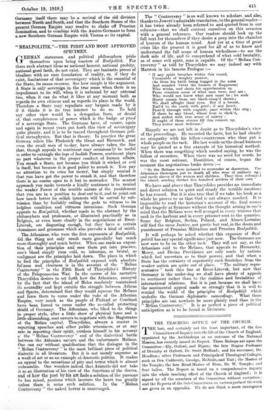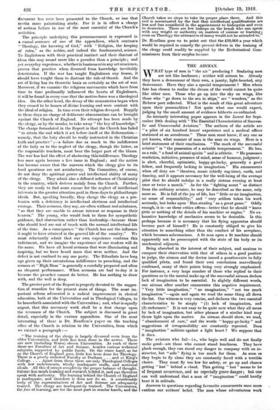THE TEACHING OFFICE OF THE CHURCH.
THE last, and certainly not the least important, of the five Committees of Inquiry into the life of the Church of England, appointed by the Archbishops as an outcome of the National Mission, has recently issued its Report. Three Bishops sat upon. the Committee—Ely, Oxford,, and Ripon; the late Regius Professor of Divinity at Oxford, Dr. Scott Holland; and his successor, Dr. Headlam ; other Professors and Principals of Theological Colleges, such as Drs. Caldecott, Goudge, MoNeile, and Tait ; the Master of the Temple; the late Head-Master of Eton, Dr. W. Temple; and four ladies. The Report is based on a comprehensive inquiry into the whole teaching effort of the Church of England ; it is signed by all the members of the Committee without exception ; and the Reports of the Sub-Committees on various parts of the work are given in an appendix. We do not think a more courageous
document has ever been presented to the Church, or one that merits more painstaking study. For it is in effect a charge of serious failure in one of the most essential of tho Church's activities.
The principle underlying this pronouncement is expressed in a casual sentence of one of the appendices, which contrasts " Theology, the knowing of God," with " Religion, the keeping of rules," as the nobler, and indeed tho fundamental, science. To Englishmen with their practical instinct and their distrust of ideas this may sound more like a paradox than a principle ; and yet everyday experience, whether in business or in any art or science, proves that practice when divorced from knowledge inevitably deteriorates. If the war has taught Englishmen any lesson, it should have taught them to distrust the rule-of-thumb. And the art of living has its theoretic basis as certainly as the art of war. Moreover, if we examine the religious movements which have from time to time profoundly influenced the hearts of Englishmen, it will be found in every ease that the motive-force was a theological idea. On the other hand, the decay of the monasteries began when they ceased to be homes of divine learning and were content with
the ideal of religion. In time even their religion decayed. Happily in these days no charge of deliberate obscurantism can be brought against the Church of England. No attempt has been made by the clergy, as by the monks, to take away " the key of knowledge." The charge formulated in the Report is that the Church has failed " to attain the end which it set before itself at the Reformation— namely, that the laity should be really instructed in the Christian
faith and practice'.' ;—a failure due as much to the indifference of the laity as to the neglect of the clergy, though the latter, as
the responsible teachers, must bear the larger part of the blame. The war has had the effect of shattering this indifference. Theology has once again become a live issue in England ; and the nation has become aware that the answers which the clergy give to its hard questions are not satisfactory. The Committee, of course, do not deny the spiritual power and intellectual ability of many of the clergy. They admit also a diffused influence of Christianity in the country, which derives mainly from the Church. Further, they are ready to find some excuse for the neglect of intellectual interests in the greater attention paid in these days to philanthropic ideals. But, speaking broadly, they charge the clergy as a pro- fession with a deficiency in intellectual alertness and intellectual courage. Their sermons, they say, are often without real substance,
"so that they are unable to arouse interest or response in their hearers." The young, who would look to them for sympathetic guidance, find obstruction rather than leadership—because those who should load are out of touch with the normal intellectual life of the time. As a consequence " the Church has not the influence it ought to have attained in the general life of the country." We must reluctantly admit that our own experience confirms this indictment, and we imagine the experience of our readers will do the same. We have all heard sermons that were illuminating and inspiring, but we have heard more that were neither. And the defect is not confined to any one party. The Ritualists have long ago given up their ostentatious indifference to preaching, and the sermon at " High Mass " is generally a carefully prepared and often an eloquent performance. When sermons are bad to-day it is because the preacher cannot do better. He has nothing to draw with, and the well is deep.
The greater part of the Report is properly devoted to the sugges- tion of remedies for the present state of things. The most im- portant reform advocated is a radical improvement in clerical education, both at the Universities and in Theological Colleges, to be henceforth associated with the Universities ; and, what is equally urgent, that this necessary work shall be a first charge upon the revenues of the Church. The subject is discussed in great detail, especially in the various appendices. One of the most interesting of these is Dr. Headlam's rarer on the teaching
office of the Church in relation to the Universities, from which we extract a paragraph :-
" The training of the clergy is largely divorced even from the older Universities, and little has been done in the newer. There are now (including Wales) eleven Universities. At each of these there are Faculties of Art and Science, besides various technical subjects, supported by public funds. On the other hand, as far as the Church of England goes, little has been done for Theology. There is a poorly endowed Faculty at Durham . . and at King's College. . . . Apart from these there are only Theological Colleges with few endowments, wholly inadequate staffs, and sectional ideals. All this destroys completely the proper balance of thought. Soignee has much learning and research behind it, and can therefore speak with authority. The learning behind the Church of England is inadequate, and therefore it does not do so. A considerable body of the representatives of Art and Science are adequately trained. Th3 clergy are inadequately trained. The Universities, the foci of learning, are for the most part in secular hands, and the Church takes no steps to take its proper place there. And this evil is accentuated by the fact that intellectual qualifications are less and less considered in the appointment to bishoprics and even to deaneries. There are few bishops on the bench who can speak with any weight or authority on matters of science or learning ; even on Theology the utterances of many would not be attended to."
Dr. Headlam goes on to point out that the £50,000 a year which would be required to remedy the present defects in the training of the clergy could readily be supplied by the Ecclesiastical Com- missioners from their surplus income.



































 Previous page
Previous page